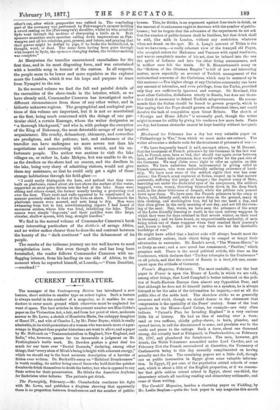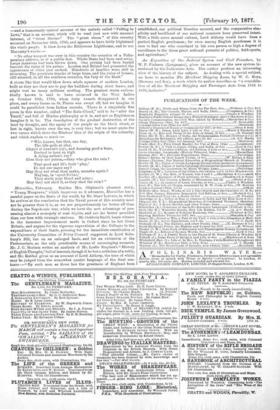The Corn/ill Magazine, besides a charming paper on Fielding, by
Mr. Leslie Stephen—quite the best paper in any magazine this month —and • humorously cynical account of the malady called "Falling in Love," that is an account, which will be read just now with unusual interest, of "Great Storms." The "great storm" of this country occurred on November 26th, 1703, and appears to have fairly frightened the whole people. It blew down the Eddystone Lighthouse, and to use Macaulay's words :— " No other tempest was ever in this country the occasion of a Palle- moutory address, or of a public fast. Whole fleets had been cast away. Large mansions had been blown down. One prelate had been buried beneath tho ruins of his palace. London and Bristol had presented the appearance of cities just sacked. Hundreds of families were still in mourning. The prostrate trunks of large trees, and the ruins of houses, still attested, in all the southern counties, the fury of the blast."
A storm like that would blow down whole squares of modern London, built as they are they are to pay the builders during short leases, and might cost us many millions sterling. The greatest storm authen- tically known is said to have occurred in the West Indies on October 10th, 1780, when forty vessels disappeared in one place, and every house on St. Pierre was swept off, but we imagine it could be paralleled. from Indian records. There is a singularly fine poem in this number, called "The Rain-Cloud," said to be "after the Tamil," and full of Hindoo philosophy as it is, and not as Englishmen Imagine it to be. The description of the gradual destruction of the land by drought, and the agony of the people as the black cloud, at last in sight, bursts over the sea, is very fine; but we must quote the two verses which state the Hindoos' idea of the origin of the calamity, and which explain so much :— " Who knows, but that, one day, The idle gods at play, Cloyed of heaven's joys, and deeming good a bane, Desired to hear on high A dying nation's cry ?
Give they not poison,—they who give the rain ?
That good and ill's their 'play,' Do not our sages say ? May they not what they make, unmake again ?
Mayhap, in 'sport divine,' They made your blood and mine ; May they not shed it, as they shed the rain?"



































 Previous page
Previous page